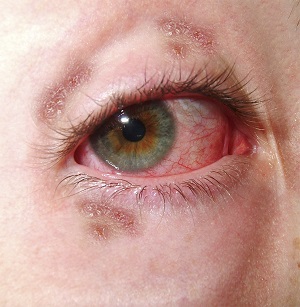
What is Herpetic Eye Disease?
Herpetic eye disease is an eye infection caused by type 1 herpes simplex virus (HSV-1), the same virus that causes cold sores and chickenpox. It can affect the cornea, eyelids, iris, choroid and the retina. Once a person is infected with HSV-1 (primary infection), the virus stays in the body in an inactive form in the nerve fibers. The virus can reactivate from time to time and lead to a Herpes eye infection called herpes simplex keratitis.
Symptoms of Herpetic Eye Disease
The symptoms of herpetic eye disease include:
- Pain in the eyes
- Discomfort with opening the eyes in bright light
- Redness of eyes
- Blurring of vision
- Watering of eyes
Diagnosis of Herpetic Eye disease
Your doctor may diagnose the disease on physical examination with the observation of your eyes. Your doctor may apply some stain on the front of the eyes and view them with a magnifier to confirm the irregularities.
Treatment for Herpetic Eye Disease
Treatment may include antiviral medications (ointments or drops) that work against the herpes infection. The infected cells may be gently scraped from the surface after applying anesthetic drops. If the infection has progressed to deep layers of the cornea, your eye specialist may apply steroid drops to reduce the inflammation.
Related Topics
- Cataract
- Glaucoma
- Eyelid Disorders
- Dry Eyes
- Blepharitis
- Chalazion
- Tear Duct Obstruction
- Refractive Errors
- Subconjunctival Hemorrhage
- Pterygium
- Hyphema
- Herpetic Eye Disease
- Acute/ Chronic/Recurrent Iridocyclitis
- Chemical Burn
- Conjunctival & Corneal tear
- Repair of Conjunctival and Corneal tear
- Corneal Opacity
- Corneal Ulcer
- Ocular/Orbital Trauma
- Treatment of Ocular/Orbital trauma
- Eyelid Cyst
- Optic Nerve Atrophy
- Optic Neuropathy
- Pars Planitis/Intermediate Uveitis
- Posterior Uveitis
- Diseases of Cornea
- Temporal Arteritis
- Traumatic Iritis
- Ocular/Orbital Tumors
- Pediatric Eye Problems

